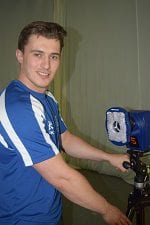 Lincoln Institute for Health Student Joseph Moore explores best treatment for patients with anterior cruciate ligament (ACL) injuries: Surgery or physiotherapy
Lincoln Institute for Health Student Joseph Moore explores best treatment for patients with anterior cruciate ligament (ACL) injuries: Surgery or physiotherapy
Treating ligament damage in knees is something sports scientists recognise as a key component in helping athletes of all levels to be at full health; but damage of this type spreads much wider than just those in the sporting environment.
Healthcare professionals across the UK treat scores of patients with anterior cruciate ligament (ACL) injuries each year which are caused by a variety of reasons; sports injury, wear and tear, age-related damage, or a simple accident.
Now, the opportunity to help find a treatment solution for ACL damage which would suit every patients’ needs is being seized by health biomechanics PhD student Joseph Moore from the University of Lincoln.
He is researching a new way to use biomarkers to determine if pre-screening tests could identify whether a patient would recover better by going down a surgical route, or moving straight to physiotherapy.
Joseph is examining the biomarkers of movement in the lower limbs. The term “biomarker” refers to a broad subcategory of medical signs – or objective indications of a medical state observed from outside the patient – which can be measured accurately and reproducibly.
Joseph said: “The ultimate goal is to lead to treatment improvements for people suffering ACL injury. These kinds of injuries can cause real pain and problems, and are usually treated with surgery or physiotherapy.
“Current practice sees treatment decisions made on physical examinations performed by the surgeon. We aim to investigate whether the use of specific characteristics of movement exhibited by the patient can lead to more informed treatment decisions.
“To provide comparisons between people with no reported ACL injury, the study will also analyse uninjured people.”
The project is a partnership with United Lincolnshire Hospitals Trust’s research and development department and orthopaedic surgeon Mr Dipak Raj. Patients are identified by the Trust, who Joseph then contacts to explain the project and invite them to participate in the study.
Part of the project involves carrying out in-depth analyses of the patient’s movements which can be completed in the University laboratories or at the Lincolnshire Clinical Research Facility at Pilgrim Hospital, Boston.
Participants will come to either collection site for analysis of their movements using special motion capture technology. Using a range of equipment, they will carry out a number of functional movement tasks: balancing, squatting, moving from sitting to standing, and strength exercises.
The Motion Analysis Corporation’s Raptor-4 camera system will gather up to 150 frames per second using four cameras which pick up the location of special reflective markers placed on different joints on the body. These cameras will also be synced to a force platform which allows the measurement of the forces of the body every third of a millisecond. This information is then sent to a software system called Cortex where the movement patterns can be analysed.
The patients’ treatment choice isn’t influenced by their participation.
Joseph added: “This in-depth analysis provides data on the most minute movements of joints and surrounding tissue to give us a complete picture of the limitations the patient is suffering from. The tests will be repeated four times; once at the start of the project, four months later, again at seven months and finally at 12 months.
“Ultimately, I hope that this study will offer insight to medical professions and influence the treatment routes and how those routes are reached.”
Joseph completed a BSc Sport and Exercise Science undergraduate degree at University of Bath, before moving on to his PhD at the University of Lincoln, titled An Investigation of Biomarkers in ACL Patients and Healthy Controls.
The PhD is being carried out though the University’s Lincoln Institute for Health under PhD supervisor Professor David Mullineaux, a Professor in Sports Science in the School of Sport & Exercise Science and Professor Chris Bridle, the Director of the Lincoln Institute for Health. The three year study is fully funded through the Doctoral Training Alliance (DTA), an initiative of University Alliance, the organisation that unites UK universities with a mission to provide high-quality teaching and research that makes a real-world impact.